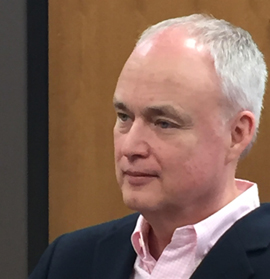Jed Reed is currently Garland ISD’s executive director of Human Resources and will retire if he is elected to place 4 on the board of trustees. As a resident of the GISD for more than 60 years, Reed has a vested interest in the district. He attended Watson and Kimberlin elementaries, Memorial Junior High and South Garland High School.
His work experience includes GISD where he served as a teacher for 18 years before holding teaching, campus administrative positions and various human resources positions for the Lewisville ISD before returning to the Garland ISD in 2007. He was also an adjunct political science instructor at Mountain View Junior College.
He has served on numerous boards and committees including the Rowlett Park Board and Rowlett Board of Adjustment and has served as sponsor of the Rowlett Youth Advisory Committee.
Reed is running for the board for the students of GISD and will promote student success, allowing skills — academic, fine art, athletic and career-related, to grow. This approach will produce well-rounded students for college as well as for careers.
This candidate celebrates the district’s diversity but said that it can bring challenges and he will address performance gaps between minority and Anglo students. On the first day of school this year every elementary bilingual classroom had a certified bilingual teacher and Reed will continue to work, as a board member, on that.
He feels that state testing results should be addressed, regardless of how one feels about these tests. Since the scores are published statewide it becomes important when people and businesses are deciding where to locate. This is important because the school district’s scores are a draw to the city and help increase the economic development of the Tri-Cities which creates an increase in the tax base. This is great for everyone.
Reed understands the challenges and difficulties of teachers and knows that it is a difficult job.
“It’s not the same job it was in the past,” he said. “Many of our teachers aren’t from the technology generation and in that case, the teachers can learn from the kids. Students learn better when they ‘say it, do it, share it, explain it.’”
He also believes that teacher training requirements and numerous principal meetings take staff out of the classroom too often and added that state and federal guidelines are not helpful in allowing districts to address problems like behavior and attendance.
Many new programs have been implemented in a short time and things should be allowed to settle in. Implementation of new programs should be because it is good for students — not to just implement something just because it is new.
“This is a situation in which a former educator can help other board members understand the teachers’ issues and the impact of decisions on the actual organization,” he said.
Reed has concerns about expenditures and said that the board must be more engaged in the budget.
“We’ve got to stop and think about taking money out of reserves when we aren’t putting it back into reserves at the same rate we are taking it out,” he said.
He added that at times in the past when other districts were laying off employees, GISD was not forced to do so because of its reserves amount.
Personnel expenses comprise 85 percent of the budget, but the number of students is slightly decreasing while the number of positions is increasing.
Supervision of the bond money is also an important issue. For example, the natatorium cost could possibly come in over budget. Additionally, the cost to operate the facility will add expenses to future budgets. Rental by outside users will not cover the operational costs.
“Income from renting it [natatorium] will not provide income to the district (above operational costs) and rental of the Curtis Culwell Center doesn’t either,” Reed said.
Reed said that because of his district experience he will know when to ask questions and when the answers need to be expanded.
“I believe in transparency and that questions should be asked,” he said. “Discussions should be open and calm with questions asked and answers provided.”
He added that the board’s key functions are: to hire the superintendent; to supervise the superintendent; and to approve the budget and expenditures.
He said that the district has to return to the community feel that it had in the past and that board members and administrators should go out into the neighborhoods and visit with taxpayers and parents.
“I care about the kids, the employees and the district. This district has supported my family with both my parents having been employees,” he said. “And I wouldn’t be who I am today without the Garland Independent School District.”


